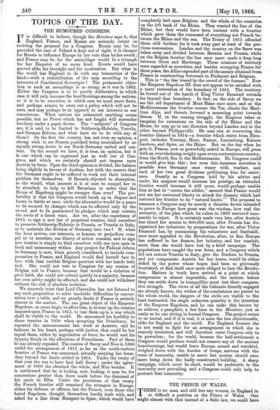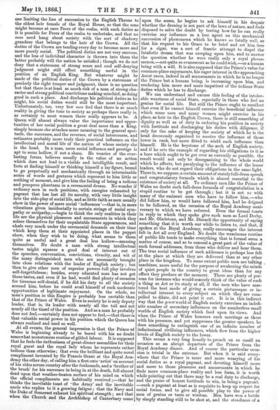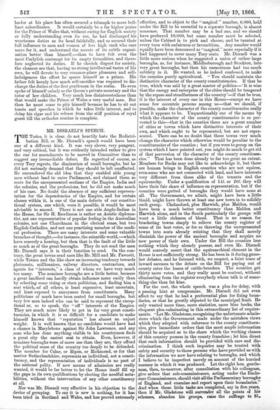THE PRINCE OF WALES.
THERE is no man, and still less any woman, in England in so difficult a position as the Prince of Wales. One might almost wish that instead of a Salk law, we could have At all events, the general impression is that the Prince of - -Wales is beginning already to be bored with his no doubt somewhat monotonous routine of gilded labour. It is supposed that he feels the enthusiasm of great-dinner assemblies for their royal guest and the royal lady whom he represents rather tedious than otherwise; that even the brilliant and quite novel compliment invented by Sir Francis Grant at the Royal Aca- demy the other day, of calling him a first-rate 'artist' on account of his rides across country after the foxhounds, and a 'brother of the brush' for his successes in being in at the death, fell almost dead upon that weather-beaten surface of his mind on which the official compliments are habitually received ;—that he thinks the inevitable toast of the Army' and the inevitable uncle who replies to it a growing fatigue ; that the Navy and the Duke of Somerset exhaust his spiritual strength ; and that upon the scene, he begins to ask himself in his despair whether the droning is not part of the laws of nature, and feels disposed to solve the doubt by testing how far he can really exercise any influence as a free agent on this mechanical succession of phenomena which he knows so fatally well, so that his request to his Grace to be brief and set him free for a cigar, was a sort of frantic attempt to dispel the fatalistic dream that was creeping upon him, and to answer the question whether he were really only a royal pheno- menon,—not quite so evanescent as he could wish,—or a human being with a will. It is also supposed that the Prince's value for common-place enjoyments, his eager interest in the approaching Ascot races, indeed in all amusements in which he is no longer the Prince but a human being, is increasing upon him, and rendering him more and more impatient of the tedious State duties which he has to discharge.
This seems a very long homily to preach on so small an occasion as an abrupt departure of the Prince from the Royal Academy dinner. And of course the particular occa- sion is trivial in the extreme. But when it is said every- where that the Prince is more and more wearying of his social duties as a royal pageant, and devoting himself more and more to those pleasures and amusements in which he finds more common-place reality and less form, it is worth while pointing out that there may be a real duty to discharge, and the praise of honest fortitude to win, in being a pageant, —such a pageant at least as is requisite to keep up respect for social forms, and to give all possible play to the power of men of genius or taste or wisdom. Men have won a battle when the Church and the Archbishop of Canterbwy come by simply standing still to be shot at, and the steadiness of a leader at his place has often secured a triumph to more bril- liant subordinates. It would certainly be a far higher praise for the Prince of Wales that, without caring for English society or fully understanding even its use, he had discharged his wearisome duties as its head faithfully, and so secured their full influence to men and women of less high rank who care more for it, and understand the secrets of its subtle organi- zation better than himselt—than to have felt even the most Carlylish contempt for its empty formalities, and there- fore neglected its duties. If he cherish disgust for society, the chances are that, having no strong intellectual tastes of his own, he will devote to very common-place pleasures and self- indulgences the effort he spares himself as a prince. His father felt keenly how much self-sacrifice was required to dis- charge the duties of the first gentleman in the realm. He even spoke of himself calmly as the Queen's private secretary and the tutor of her children. Very much less disinterestedness than that would make the Prince of Wales a very useful man. But then he must cease to pity himself because he has to sit out toasts and speeches in which he takes little interest, and to delay his cigar and his release from the stiff position of royal guest till the orthodox routine is complete.
































 Previous page
Previous page